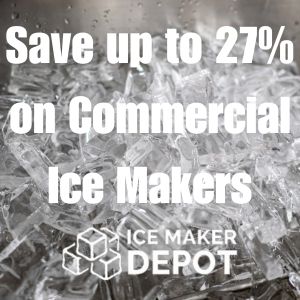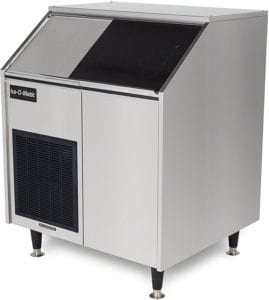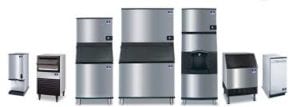
The Pros and Cons of Air-Cooled vs. Water-Cooled Ice Makers
Choosing the right commercial ice maker is critical for any business that relies on a steady supply of ice. Whether you run a restaurant, hotel, hospital, or bar, having an efficient and reliable ice maker ensures smooth operations. One of the most important decisions to make when purchasing an ice machine is whether to go with an air-cooled or water-cooled model. Each has its advantages and disadvantages, and the best choice depends on factors such as climate, water availability, energy efficiency, and cost considerations.
As a graduate of Purdue University with a bachelor’s degree in Mechanical Engineering, and the owner of a successful commercial refrigeration and ice machine supply company in Florida for the past 15 years, I’ve helped businesses select the right ice makers for their unique needs. Through my work with Ice Maker Depot, I’ve seen firsthand how choosing the right cooling method can impact efficiency, cost, and overall performance.
In this article, I’ll break down the pros and cons of air-cooled vs. water-cooled ice makers to help you make the best decision for your business.

Understanding the Difference Between Air-Cooled and Water-Cooled Ice Makers
Before diving into the pros and cons, it’s important to understand how these two types of ice makers work.
Air-Cooled Ice Makers
Air-cooled ice machines use fans and vents to remove heat from the refrigeration system. These machines pull in surrounding air, cool the internal components, and expel the excess heat back into the environment.
Water-Cooled Ice Makers
Water-cooled ice machines use water to cool the refrigeration system instead of air. A continuous flow of water runs over the condenser coils, absorbs heat, and then drains away.
Both systems serve the same purpose—cooling the machine to ensure efficient ice production—but they operate differently and have distinct advantages and drawbacks.

The Pros and Cons of Air-Cooled Ice Makers
Pros of Air-Cooled Ice Makers
Energy Efficiency
Air-cooled ice makers are generally more energy-efficient than water-cooled models because they don’t require a continuous flow of water to function. This can lead to lower operating costs over time.
Lower Water Costs
Since air-cooled ice makers do not rely on water for cooling, they consume significantly less water, making them a great choice for businesses looking to reduce their water bills.
Easier Installation
Air-cooled units are easier to install because they don’t require a dedicated water line for cooling. This simplifies the setup process and reduces installation costs.
Environmentally Friendly
Because they use less water, air-cooled ice makers are often considered more eco-friendly compared to water-cooled models. Businesses focused on sustainability may find this an appealing option.

Cons of Air-Cooled Ice Makers
Heat Output
One of the biggest downsides of air-cooled ice machines is that they generate a lot of heat. In a small or poorly ventilated space, this can cause the ambient temperature to rise, making air conditioning systems work harder and increasing energy costs.
Noise Levels
Air-cooled ice makers rely on fans and vents to regulate temperature, which can make them noisier than water-cooled models. This can be an issue in quiet environments like small cafes or office break rooms.
Performance in Hot Climates
Since air-cooled ice makers depend on ambient air for cooling, they can struggle to operate efficiently in hot and humid environments. If your business is located in an area with high temperatures, an air-cooled unit may not perform as well as expected.
The Pros and Cons of Water-Cooled Ice Makers
Pros of Water-Cooled Ice Makers
Consistent Performance in Hot Environments
Unlike air-cooled models, water-cooled ice makers are not affected by ambient air temperature. This makes them an excellent choice for businesses located in hot climates or in kitchens with limited airflow.
Quieter Operation
Water-cooled units do not rely on fans, making them much quieter than air-cooled ice makers. If noise is a concern, such as in hotels, offices, or small restaurants, a water-cooled ice maker may be the better choice.
Higher Efficiency in High-Volume Settings
For businesses that require large amounts of ice daily, water-cooled machines tend to operate more efficiently than air-cooled models. They can produce more ice in less time, making them ideal for hospitals, large bars, or catering services.
Cons of Water-Cooled Ice Makers
High Water Usage
The biggest drawback of water-cooled ice makers is that they use a significant amount of water for cooling. This can result in higher water bills and increased operational costs. Some municipalities even have restrictions on water-cooled ice machines due to conservation efforts.
Additional Plumbing Requirements
Water-cooled ice makers require a dedicated water line and proper drainage system. This makes installation more complex and costly, especially in locations that do not already have the necessary plumbing.
Potential for Increased Costs Over Time
Because water is a recurring cost, businesses need to weigh the long-term expenses. While water-cooled machines may be more efficient in certain conditions, the ongoing cost of water consumption can outweigh the benefits in areas where water prices are high.

Which Ice Maker is Right for Your Business?
Choosing between an air-cooled or water-cooled ice maker depends on several factors. Here’s a quick breakdown to help determine the best fit for your business.
Choose an Air-Cooled Ice Maker If:
- You want lower energy and water costs
- Your business is located in a moderate climate
- You have adequate ventilation to handle heat output
- You prefer a simpler installation process
Choose a Water-Cooled Ice Maker If:
- Your business operates in a hot or humid environment
- You need high-volume ice production on a daily basis
- You want a quieter machine for customer-facing areas
- You have reliable and affordable water access
Selecting the right ice maker can make a huge difference in your business’s efficiency, costs, and overall ice production. Air-cooled ice makers are great for businesses looking to save on water costs and maintain a simple installation, while water-cooled ice makers excel in high-volume, high-temperature environments where reliability is key.
Before making a decision, consider your climate, available space, water costs, and daily ice production needs. Whether you choose air-cooled or water-cooled, investing in the right commercial ice maker will ensure your business runs smoothly and efficiently.
About the Author
James Calloway is a Purdue University graduate with a bachelor’s degree in Mechanical Engineering. As a writer and editor for Ice Maker Depot and the owner of a successful commercial refrigeration and ice machine supply company in Florida for 15 years, James specializes in helping businesses select, maintain, and optimize their ice-making equipment for maximum efficiency.
